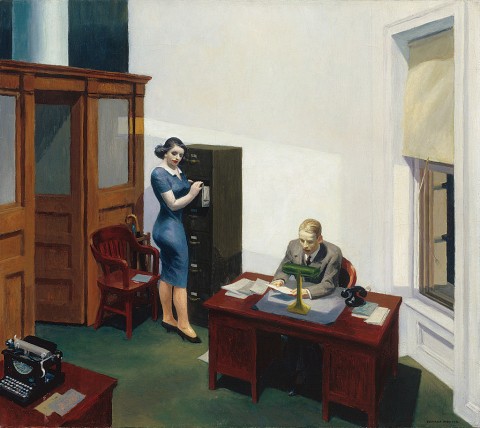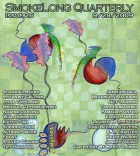They don’t seem to be working, though up to a few minutes ago, she was filing papers. A man (whom we assume is her boss) sits reading a page at his desk, holding it beneath a green banker’s light. Her plump right arm is bent to encompass a generous bosom and her right hand rests on the edge of the open file drawer. Perhaps seconds ago she turned toward the man at the desk. Her face is vulnerable, intent. She is waiting. A piece of paper, partly hidden by the desk, lies on the floor between her and the man. We are led to believe that Edward Hopper is in a train, glimpsing this scene as he is passing by on Chicago’s El.
A voluptuous curve—perhaps the most voluptuous in all of Hopper’s paintings, almost to a surreal degree—belongs to this secretary in the night-blue dress in “Office at Night,” an oil on canvas, l940. What word, in 1940, would have been used to describe those rounded globes beneath the stretch, from rounded hip to hip, of her blue dress?
If it weren’t for that piece of paper on the floor, we might believe the museum’s prim description of this painting. It says: “The secretary’s exaggerated sexualized persona contrasts with the buttoned-up indifference of her boss; the frisson of their intimate overtime is undermined by a sense that the scene’s erotic expectations are not likely to be met.”
Indifference? Wrong. The man is far too intent on the paper he is reading—and he is not sitting head-on at his desk. He is somewhat tilted—toward the secretary. His mouth is slightly open as if to speak. His left ear is red. It is. It is red.
And what of their day? Her desk faces his in this small cramped office. He must have looked up from his papers to say to her, seated behind her black typewriter, that tonight they must stay late. Did she call her mother, or two roommates she met while attending Katherine Gibbs, to say her boss asked her to stay late? On other evenings, she would have finished dinner, perhaps been mending her stockings or watching the newsreel at the cinema’s double feature.
But here she is tonight, looking down at the paper on the floor. Was it she who dropped it? It is true that her dress has a chaste white collar, but the deep V of the neckline will surely fall open when she stoops to retrieve it. Or did the man drop the paper? Is she acknowledging this before she stoops over, perhaps bending at the knees over her spiffy black pumps, to retrieve the page? Another paper has been nudged toward the desk’s edge and shows a refusal to lie flat in the slight breeze blowing the window shade into the office. Other papers are held in place by the 1940s telephone, so heavy that in a forties noir film it might serve as the murder weapon.
Perhaps this story began at an earlier time. It might already be a situation, causing the young woman, just this morning, to choose this particular blue dress. We are all in the middle of their drama. She will bend before him. Someone will turn off the lights. They will leave before midnight. Perhaps it won’t turn out well. But for now her blue dress cannot be ignored.



 The core workshop of SmokeLong Fitness is all in writing, so you can take part from anywhere at anytime. We are excited about creating a supportive, consistent and structured environment for flash writers to work on their craft in a community. We are thrilled and proud to say that our workshop participants have won, placed, or been listed in every major flash competition. Community works.
The core workshop of SmokeLong Fitness is all in writing, so you can take part from anywhere at anytime. We are excited about creating a supportive, consistent and structured environment for flash writers to work on their craft in a community. We are thrilled and proud to say that our workshop participants have won, placed, or been listed in every major flash competition. Community works.